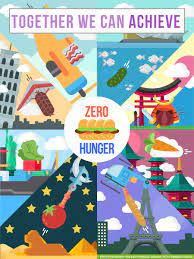Zero Hunger: A Vision for a Hunger-Free World
Zero Hunger: A Vision for a Hunger-Free World

Introduction
Hunger is one of the most devastating global challenges, affecting millions of people worldwide. Despite advancements in food production, many still struggle to access sufficient, nutritious food. The United Nations has set Zero Hunger as the second Sustainable Development Goal (SDG), aiming to end hunger, achieve food security, and promote sustainable agriculture by 2030. Ensuring that everyone has enough to eat is not just a moral responsibility but a crucial step toward a healthier and more prosperous world.
Causes of Hunger
Hunger is a result of various interconnected factors, including:
Poverty – Many people cannot afford nutritious food due to financial constraints.
Food Waste – A significant portion of food is wasted globally, while millions remain hungry.
Climate Change – Extreme weather conditions, droughts, and floods impact food production.
Conflict and War – Political instability disrupts food supply chains, leading to food shortages.
Lack of Agricultural Resources – Small-scale farmers often lack access to modern farming techniques, quality seeds, and financial support.Solutions to Achieve Zero Hunger
Ending hunger requires coordinated efforts at local, national, and global levels. Some key strategies include:
Sustainable Agriculture – Promoting eco-friendly farming practices, improving irrigation systems, and supporting small farmers can increase food production.
Reducing Food Waste – Encouraging responsible consumption and improving food distribution systems can ensure food reaches those in need.
Improving Economic Opportunities – Providing better job opportunities and fair wages helps people afford nutritious food.
Strengthening Food Security Programs – Governments and organizations should expand school meal programs, food banks, and social welfare initiatives.
Addressing Climate Change – Sustainable policies to combat climate change can help protect food production.
Empowering Communities – Educating people on nutrition, agriculture, and self-sufficiency can help build hunger-resilient societies.
Conclusion
Achieving Zero Hunger is not just about producing more food but ensuring equal access to it. Through sustainable practices, economic empowerment, and effective policies, we can create a world where no one goes to bed hungry. A well-fed population leads to a healthier, more productive society, paving the way for global progress and prosperity.
Do charity
#BanoKisiKiMuskan
Be someone’s reason to smile
For Donation call us @ 9711364750
www.padindia.org
Send ur resume at
info@padindia.org
https://www.youtube.com/padindia
https://www.linkedin.com/company/padindia
https://www.facebook.com/Padvoice/
https://www.facebook.com/voiceofindiantaxpayers/